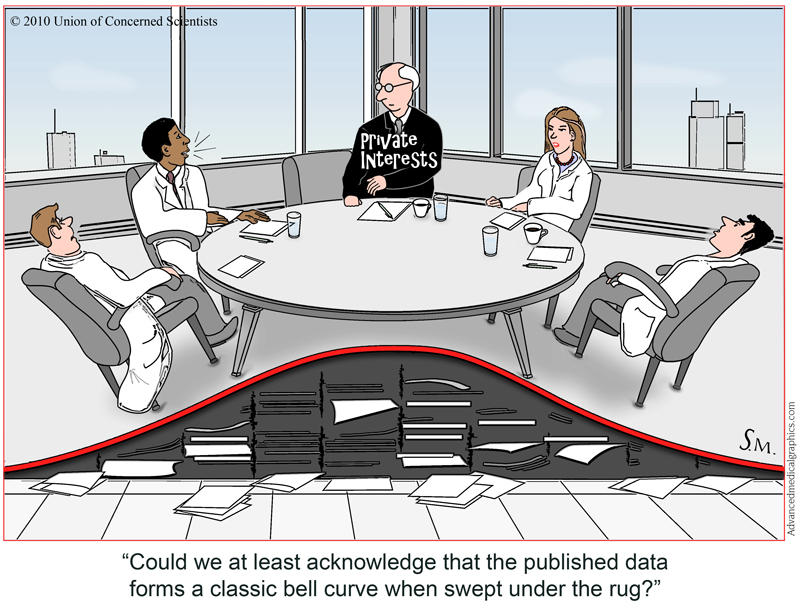As I’m sure you’ve noticed, we have been blogging quite a bit recently about the FDA. This corresponds to legislation that would determine how the FDA approves and monitors drugs and medical devices. But why have we been so focused on reducing the number of FDA advisory panel members who have financial conflicts-of-interest?
Because advisory committees are extremely important to the decisions that FDA makes. Here are five reasons why the Congress can and should allow FDA to retain strong conflict-of-interest standards for its scientific advisory panels:
1) The votes of conflicted experts can make a difference in the outcome of advisory committee recommendations. A 2005 analysis of advisory votes by the Center for Science in the Public Interest found that 10 of the 32 advisors on an FDA panel evaluating the painkillers Bextra, Vioxx and Celebrex had financial ties to the makers of the drugs. In the case of Bextra and Vioxx, the conflicted experts’ votes made the difference between approval and denial. The vote to allow Bextra to stay on the market was 17 to 13, with nine of the conflicted experts voting in the affirmative. The panel voted 17 to 15 to allow Vioxx to return to the market, with nine conflicted experts voting yes.
 Just this past December, the FDA convened an advisory panel to evaluate the safety of the contraceptive drug Yaz. Washington Monthly and the British Medical Journal (BMJ) reported that at least four scientists on the panel had financial ties to Bayer, the drug’s manufacturer, or its affiliates. A fifth scientist had been paid by a law firm representing the company. The committee voted 15 to 11 that the benefits outweighed the risks; had the conflicted scientists not voted, the vote would have gone down the other way. The FDA failed to disclose any of these relationships or to disqualify any of the conflicted panelists.
Just this past December, the FDA convened an advisory panel to evaluate the safety of the contraceptive drug Yaz. Washington Monthly and the British Medical Journal (BMJ) reported that at least four scientists on the panel had financial ties to Bayer, the drug’s manufacturer, or its affiliates. A fifth scientist had been paid by a law firm representing the company. The committee voted 15 to 11 that the benefits outweighed the risks; had the conflicted scientists not voted, the vote would have gone down the other way. The FDA failed to disclose any of these relationships or to disqualify any of the conflicted panelists.
2) Strong opinions of those with a financial stake in the outcome can have extraordinary influence on the opinions of other panel members. A study by the National Research Center for Women and Families found that individual committee members can have a disproportionate influence on approval recommendations. According to the study, “committee members describe pressure to conform and to recommend approval, and they candidly admit that their votes for approval may not be consistent with their concerns about safety and effectiveness.”
3) There is a large pool of potential advisory panel members who are conflict-free. According to estimates by Dr. Susan Wood, a professor at George Washington University’s School of Public Health and Health Services, there are over 130,000 qualified experts in America’s 135 medical schools, 123 schools of pharmacy, and 48 schools of public health. Even if 50 percent had financial conflicts, that would leave 60,000 candidates for 500-600 FDA advisory panel positions.
4) Other agencies with even more robust standards operate committees that are free from conflicts. The National Institute of Health’s Office of Medical Applications of Research staffs consensus panels formed to evaluate complex medical issues. Panel members include scientists, health professionals, epidemiologists, and those experienced in clinical trials. These panels do not permit any conflicted experts to participate. These same conflict bans apply to the Agency for Healthcare Research and Quality, and the U.S. Preventive Services Task Force (USPSTF), which assesses the evidence of various disease prevention strategies.
5) Conflicted experts shake public faith in the integrity of the FDA and in the safety of drugs and devices. The perception that the government is acting in the best interest of companies rather than its people has eroded public confidence in the FDA’s ability to protect us from unsafe products. Conflicted experts, regardless of the level of their involvement, make the public skeptical of integrity of the federal government.
